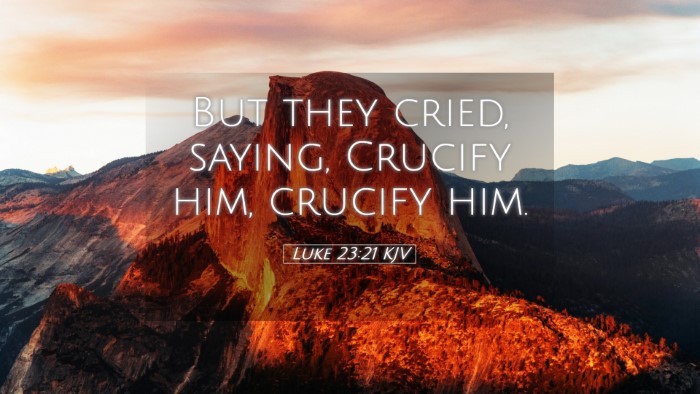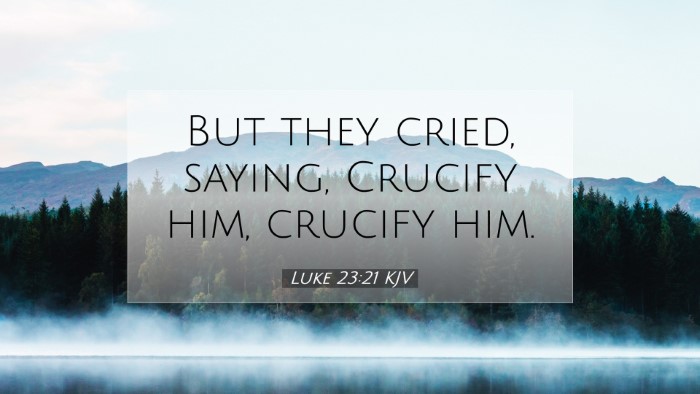Commentary on Luke 23:21
Luke 23:21 states: "But they cried, saying, Crucify him, crucify him." This powerful verse encapsulates the intense emotional and spiritual dynamics surrounding the trial of Jesus Christ, illustrating the conflict between the will of the crowd and the will of God. Below, we compile insights from esteemed public domain commentaries to provide a thorough examination of this scripture.
Historical Context
This cry for crucifixion emerges from a deeply charged atmosphere within Jerusalem. The populace, stirred by religious leaders, showcases the human propensity to forsake justice in favor of mob mentality. Matthew Henry notes that the chief priests and scribes had incited the crowd against Jesus to fulfill their malicious intent, revealing their desperation to eliminate His influence.
The Role of the Crowd
In this moment, the crowd is pivotal. Adam Clarke remarks that the voices of the people often overshadowed reason, wisdom, and justice. Their desperate shout for crucifixion accentuates the tragic irony that the very people who had benefitted from His miracles now demand His death, betraying a deep-seated fear and misunderstanding of Jesus’ mission.
- Public Sentiment: Albert Barnes emphasizes that the fervor of public sentiment can dictate actions counter to moral and ethical reasoning. The crowd, manipulated by religious authorities, demonstrates how collective voices can warp perceptions of truth and justice.
- Moral Responsibility: Matthew Henry points out that each individual within the crowd bears moral responsibility for their collective choice. This verse serves as a sobering reminder that in the face of truth, silence can equate to complicity.
- Fulfillment of Prophecy: Adam Clarke notes the prophetic significance of this moment as it aligns with Isaiah's prophecies about the suffering servant. The fulfillment demonstrates God's sovereign control over events leading to the crucifixion.
Theological Implications
This verse raises profound theological questions regarding free will, divine sovereignty, and the nature of sin. It invites reflection on the mystery of how God allows human agency, even when it leads to the execution of an innocent life.
- Free Will: Each person in the crowd exercised free will, and yet their decisions led them to demand the death of their Messiah. This dual reality is crucial in understanding the nature of man and his relationship with God, as Clarke illustrates that while God is sovereign, humanity's choices carry significant consequences.
- Sin and Redemption: The demand for crucifixion symbolizes not just the rejection of Christ but the broader human condition. The collective cry is reflective of humanity's default posture towards sin—a rebellion against God’s perfect will. Both Henry and Barnes highlight that it is Christ’s willing acceptance of this fate that offers redemption to all who believe.
Applications for Today
For pastors, students, and theologians, this verse serves as a reminder of the ever-present temptation to follow the crowd, neglecting the call to individual integrity and moral courage. It prompts introspection about the ways we might also cry out for things contrary to God’s will.
- Stand Firm in Conviction: The intense pressure to conform should not deter believers from standing firm in their faith, echoing the steadfastness of Christ in His trial.
- Awareness of Influence: Recognizing the influence of societal and cultural factors in spiritual discernment is crucial. Like the crowd, we too can be swayed, highlighting the need for vigilance in our spiritual journeys.
- A Call to Advocacy: Advocating for the marginalized and innocent, as Jesus was, reflects true discipleship. This moment should inspire believers to respond to injustice with courage and compassion.
Conclusion
Luke 23:21 captures a pivotal moment in the narrative of Christ's passion, reflecting not only the heart of human depravity but also the depth of divine love. As believers reflect on this verse, it should inspire us to consider our responses to Christ in light of our current cultural landscape. The legacy of the crowd's cry warns against the dangers of collective decision-making devoid of truth and highlights the sacrificial love of Christ, who, despite the denunciation, remained steadfast in His redemptive mission.


